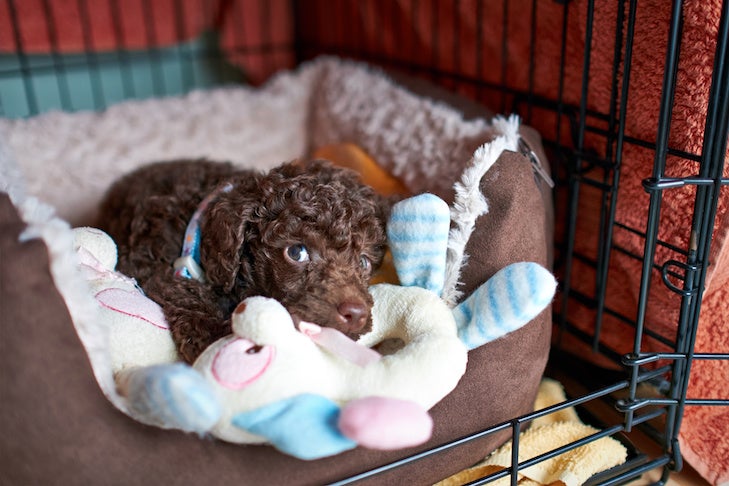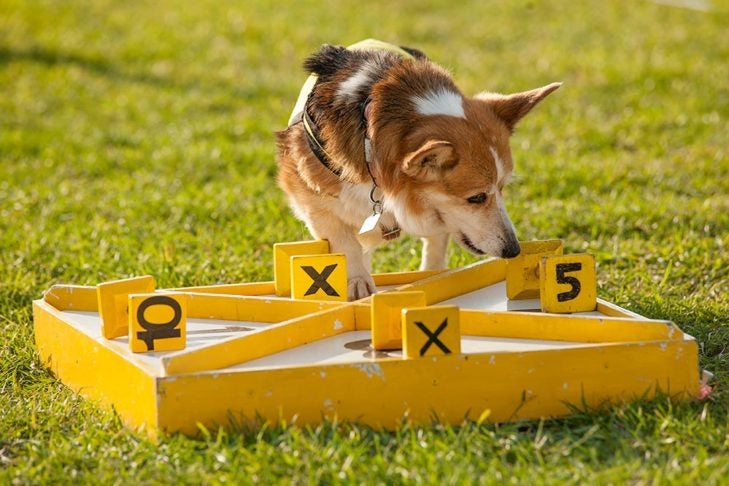
You open your front door to pick up a package, then your dog bolts out and is gone. Or you’re taking a peaceful walk with your dog, and suddenly they’re chasing a rabbit, out of sight. One of a dog owner’s worst nightmares is having their dog run away, yet it’s an all too common, potentially dangerous scenario.
Reasons Dogs Might Run Away
Dr. Amy L. Pike, a board-certified veterinary behaviorist, notes that there are a few main scenarios that typically cause dogs to run away. When it comes to hunting for food, Dr. Pike says that cats are more likely than dogs to leave home to hunt, since dogs rely more on humans for food. Typically, dogs will run away:
- If they want to chase after passing dogs or people
- If they don’t know how to wait at the door while owners open it
- If they’re bored. A lack of enrichment makes some dogs search outside for stimulation
- If they’re feeling nervous. Anxiety and fear can cause fright and flight behavior
- If they’re intact (not spayed or neutered), dogs may run out to try and find a mate

Are Certain Breeds More Likely to Run Away?
According to Dr. Pike, any breed of dog could or would run away if given the opportunity and the motivation. “Young dogs are definitely going to be more prone to this because they likely haven’t been taught to wait at the door yet,” she says. “Old dogs might also escape, especially if they have dementia or hearing loss that causes them to be confused or unable to hear a verbal cue to stay.”
Some dogs may also have a hard time adjusting to new circumstances, such as moving to a new house. “Prior training may not be generalized, meaning, if the dog knew to stay and wait when the door opened in a previous home, they may not understand that they are supposed to do the same thing in the new home,” Dr. Pike explains.
What Triggers Can Cause Dogs to Run Away?
Dogs are smart, and they learn our routines. “Dogs chain together actions — when the doorbell rings, [owner] opens the door. Therefore, it’s an opportunity to door dash,” Dr. Pike says. So, a doorbell can serve as a trigger to run.

Something as simple as a squirrel running by the yard can stimulate your dog to escape. A bored dog looking for something to do might wander out of the yard and follow their nose to who knows where. Perhaps you’re not home and your dog is stressed without you. They may decide to go look for you when one of your kids opens the door.
You could also be out walking your dog, and that canine nose or hearing picks up something you’re not even aware of. Truck noises, storms, and cars backfiring all can cause a fear reaction. “When dogs take off, especially if it was because of a noise, they are trying to get as far away as possible and not necessarily thinking rationally about heading back home,” Dr. Pike says.
Preventing Your Dog from Running Away
If your dog is showing signs of making a run for it, Dr. Pike advises you to first seek help from your veterinarian. “Noise phobias can actually be a sign of pain somewhere in the dog, like arthritis or GI pain,” she explains. If no medical cause for the phobia is identified, she recommends seeking treatment with a qualified force-free trainer or animal behaviorist.
Dr. Pike also emphasizes training an alternate behavior, such as teaching your dog to wait away from the door when you open it. The alternate behavior must be more rewarding than going out the door, for example resulting in a special treat.
It’s important to take immediate steps to keep your dog safe. “If the dog is a known door dasher, management is going to be key until the alternate behavior is trained. You might place your dog in a closed room, such as the hall bathroom or an office when you open the door or place a baby gate at the vestibule to the entrance,” she suggests. You can also use a crate.

“I had a door dasher myself — a little Miniature Schnauzer named ‘Coopersmith’ who just thought it was the best fun to run around the neighborhood and greet everyone and chase bunnies,” Dr. Pike says. “Since at the time I also had toddlers who were prone to leaving doors open, we installed a lock above the height where the kids could access it and automatic door closers to all the doors that led outside. We also taught Coopersmith to wait in the living room when the adults were opening the doors for guests or deliveries.”
Ensuring Your Dog’s Safety
Whenever you walk a dog who may run, Dr. Pike advises making sure the dog is wearing an escape-proof harness or using a double system, such as an additional leash attached to a martingale collar and a waist-wrap on you.
The American Animal Hospital Association suggests you discourage your dog from running away by building a fence and checking it regularly for potential escape routes in your yard, such as holes or piles of firewood that can be climbed.
Providing a food puzzle for your dog when you go out and making sure your dog gets appropriate exercise — think walks and hikes, agility, or scent work classes — can keep boredom at bay.

Leave your dog home when you attend fireworks or parades. Even very sociable dogs can become overwhelmed and fearful. And take the time necessary to teach your dog important commands, such as “stay,” “come,” and “down.”
Here are some steps you can take to prepare, so if your dog runs away you’ll be more likely to get them back:
- Keep an up-to-date and legible collar identification tag or personalized collar on your dog
- Have your dog microchipped. When the chip number is registered with an organization like AKC Reunite and your dog runs away, you and your alternate contacts will be notified when your pet is turned in to a veterinarian or shelter
- Have your dog wear a GPS device that will track their exact location. You may also be able to program the device to alert your dogs with vibrations or beeps when they near the boundaries of your property. Check the batteries often
This article is intended solely as general guidance, and does not constitute health or other professional advice. Individual situations and applicable laws vary by jurisdiction, and you are encouraged to obtain appropriate advice from qualified professionals in the applicable jurisdictions. We make no representations or warranties concerning any course of action taken by any person following or otherwise using the information offered or provided in this article, including any such information associated with and provided in connection with third-party products, and we will not be liable for any direct, indirect, consequential, special, exemplary or other damages that may result, including but not limited to economic loss, injury, illness or death.

